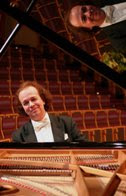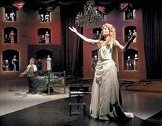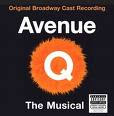
And so it was a good relaxing weekend of interesting film, music, food and hanging out with life's best friends. We had a DVD Double Bill screening of "The Immortal Beloved" and "Sketches of Frank Gehry" on Saturday. The movie screening times were a bit off from what was originally scheduled, as the darling motley crew (plus a dog or two) trotted in and out of the Treehouse at various times. But it all proceeded and ended rather well, with not too much leftover food at home, or even at Macpherson hawker centre where we ordered more than $20 worth of Ngoh Hiang for supper (so much so that the Uncle there had to make sure he counted the right number of plates for us. heh).
That night, after consolidating the bags of leftover chips in the house, I sat at the laptop and did the usual wikipedia-ing of the various questions that flashed through my mind while watching the movies that evening, for e.g.:
Did anyone finally find out who Beethoven's "Immortal Beloved" was? Did no one get his inheritance? How much did he leave anyway (I thought most composers died poor)? Why did Beethoven insist on conducting his works even though he was stone deaf?
Did anyone finally find out who Beethoven's "Immortal Beloved" was? Did no one get his inheritance? How much did he leave anyway (I thought most composers died poor)? Why did Beethoven insist on conducting his works even though he was stone deaf?
As for the Gehry documentary, one might have wondered:
What was Frank Gehry's real (Jewish) name? What sort of anti-semitism did he really face in America in the 50s? And who was the "Maggie" for whom he designed this astonishingly simple but beautiful Maggie's Place (cancer healing centre) in Dundee, Scotland?
What was Frank Gehry's real (Jewish) name? What sort of anti-semitism did he really face in America in the 50s? And who was the "Maggie" for whom he designed this astonishingly simple but beautiful Maggie's Place (cancer healing centre) in Dundee, Scotland?

There's much information and theory out there, and most of it pretty intriguing stuff. I was also rather pleased to find the full transcripts of the movies online.
But that night, I randomly came across a startlingly relevant quote by Duke Ellington that summed up my personal response to both movies almost perfectly:
"Writing about Music is like dancing about Architecture."
I think it's true. There are some artforms where it is hard to write or even talk about them to someone else concerning their impact on yourself and to do full justice to their greatness. Music (especially classical?) and Architecture seem to me to be two of them. You can read great literature on paper (of course), and look at great paintings online (sort of). But to appreciate great concert music, you must go listen to it in a concert, and to appreciate architecture, you must go stand in front of the building. That, I think, is part of the reason why one was also likely to be a little disappointed watching a movie about a composer or an architect. A 2-hour long drama, one soundtrack (a good one though it was) and a 32-inch TV in a living room could only do so much.
Last week, in my brain-fried state, I blogged about how the film Sketches made me less inclined towards the architecture of Gehry than before I watched it. I think I know now why I felt that way - I was looking for an exposition of the creative processes that Gehry went through in his design, which the film did not (and probably did not set out to) achieve. I was curious to see how he developed his architectural ideas from his famous sketches, and how he would incorporate principles of form, composition and utility into his plans. In other words, I wanted to learn about the nuts and bolts (i.e. "science") of how you turn an artistic idea into artistic reality. But that was what the movie did not do for me.
Instead, the movie largely followed a more common approach taken by directors of these types of films, - i.e. even though it alluded to some of those artistic processes, the film seemed more interested in preserving the romantic, mysterious idea that it was, at the end of the day, all about "talent" in a few gifted individuals like Gehry. In the words of Milton, Gehry's psychotherapist who was interviewed in the movie: "...other architects have come to me, but I tell them that I can't make them into Gehrys because they do not have his talent. You can open the floodgates, but then if there is no flood behind ..." I kept wondering if Gehry really agreed with that portrayal, and if he was not embarassed when the script required him to say in the movie that he built the Disney Concert Hall after looking into his wastepaper basket at the intriguing shapes of trash in there.
Now, for anyone who has attempted to pursue any of the artforms (whether as a professional or even as a casual hobbyist), he or she would know that much of that pursuit involves the plain ordinary hard work of figuring out how sounds, colour, light and chemicals interact in this material world. For instance, one does not "become" a great painter. Van Gogh had to take a class in perspective drawing (before that he thought drawing was pure luck or witchcraft). Gershwin had to put himself through a orchestral composition class even after he wrote his cool Rhapsody in Blue. And me, the once-a-week art student, still has has a long way to go in figuring out the chemical formulae on my paint-tubes in order to discover the 2,500 colours that I should be able to obtain from the standard palette of 9 pigments, all of different translucencies, grain and tone.
I came across a local photographer introduced to me recently, and I appreciate how he honestly and unashamedly admits that, whether while taking photographs for clients for a living or in pursuing his own art, he says - "I work my ass off".

Anyway, back to the two movies. Suffice it to say that I still have absolutely no idea how a music composer or an architect work their craft. But what I did appreciate very much about both films, and was deeply moved by, were the glimpses into the inner worlds of the protagonists. I went away feeling the poignancy of two men, two artists, each of whom was caught in that struggle of wanting to be "the nice guy" (or to be loved), seeking perfection of themselves, and wanting to change this world by pushing its limits with Art.
(Now playing: Second movement of the "Emperor" Concerto, by Ludvig van Beethoven.)






















